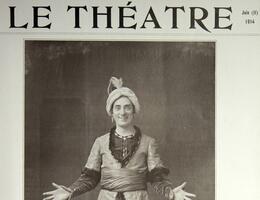
Henri RABAUD
1873 - 1949
Conductor, Composer
Born into a family of brilliant musicians, Henri Rabaud benefited from a well-rounded general and artistic education from a very early age. While continuing his studies at the Lycée Condorcet, he had no problem entering the Paris Conservatoire where, after several years spent in the classes of Gedalge (counterpoint and fugue) and Massenet (composition), he won the Grand Prix de Rome on his first attempt (1894), a prize that allowed him to stay at the Villa Medici. It was during this period that he wrote some of the works that were to make his reputation as a talented composer with a love of classical purity, such as his Second Symphony, the Procession nocturne, the Divertissement sur des airs russes, the Églogue, the String Quartet, the oratorio Job and the Psaume IV. This initial recognition allowed him to make his opera debut soon after with La Fille de Roland (1904). This was later followed by L’Appel de la mer (1924), Rolande et le mauvais garçon (1934), Martine (1947) then Le Jeu de l’amour et du hasard (1948). However, his greatest success was indisputably Mârouf, savetier du Caire (1914), an opera based on the Arabian Nights. At the same time, his reputation as a conductor took him to the rostrum at the Paris Opéra and the Opéra-Comique (1908) then, ten years later, to that of the Boston Symphony Orchestra. A well-known figure in the music world, Rabaud also enjoyed a prestigious institutional career, succeeding Widor at the Académie des Beaux-arts (1918) and Fauré as director of the Paris Conservatoire (1920-1941).
Documents and archives

Press illustration, Picture of a scene, Photograph
Scène de Marouf savetier du Caire (Rabaud) : acte III

Press illustration, Picture of a scene, Photograph
Scène de Marouf savetier du Caire (Rabaud) : acte IV
Scientific publications
Publication











